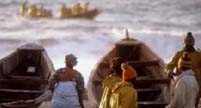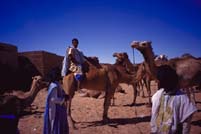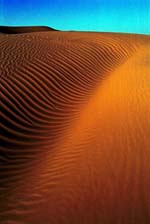 |
|
| The Burning Sands |
 |
|
|
|

The town of Tichit in Mauritania was first build in the 8th century. It was renowned as a cultural and religious center, famous for its libraries, architectures and markets. Today, however, this town of shepherds and camel herders is running out of water. They turn for help to an unlikely hero Mohammed Lemine, the water hunter who's been known to track down hidden pools in the most arid regions.
Water is so important here that wells are among the most valuable possessions people own. Water rights instead of land rights are passed down from father to son, but all the wells have begun to evaporate.
 As the Harmattan picks up, Lemine sets to work. Looking out across the dunes for the signs of ancient waterways, he's hunting for a fault line, where water might have speeded down through the rocks, and been trapped thousands of years ago. Lemine and his team use a kind of sonar sending electronic signals deep into the earth so that the echoes will create a picture of the area under the ground. Lemine soon comes to a decision. His reputation and the hopes of the town are riding on his choice. As the Harmattan picks up, Lemine sets to work. Looking out across the dunes for the signs of ancient waterways, he's hunting for a fault line, where water might have speeded down through the rocks, and been trapped thousands of years ago. Lemine and his team use a kind of sonar sending electronic signals deep into the earth so that the echoes will create a picture of the area under the ground. Lemine soon comes to a decision. His reputation and the hopes of the town are riding on his choice.
The next morning, they bring generators, a gas tanker, and a corundum drill—the newest equipment to a town that seems lost in the past. The villagers are drawn to the spectacle for it could change their lives. The work is grueling, the heat oppressive, and the progress slow. And every day here comes at a cost of 8,000 dollars, more than most of these people will earn in a lifetime. The pressure is mounting on Lemine to deliver. But just 15 feet down, they run into an unexpected layer of hard rock. Slowly, carefully, they ease up the drill and hold their breath. If the bit is broken, it could end up taking months to replace.
 As the next day dawns, there's a new obstacle to the drilling. They've hit a layer of solid rock. And the drill is stuck fast. Before they can continue, the drill must be freed. The villagers grow increasingly concerned. They help in the only way they can—with music and prayers. Hours go by and finally the work can begin again. Spray of mud brings first hope, then a cloud of mist, and suddenly, water! At last the Sahara has relinquished its grip and offered up the precious liquid. As the next day dawns, there's a new obstacle to the drilling. They've hit a layer of solid rock. And the drill is stuck fast. Before they can continue, the drill must be freed. The villagers grow increasingly concerned. They help in the only way they can—with music and prayers. Hours go by and finally the work can begin again. Spray of mud brings first hope, then a cloud of mist, and suddenly, water! At last the Sahara has relinquished its grip and offered up the precious liquid.
Every day, the desert swallows another chunk of the earth. Yet now, perhaps, there is a chance to reclaim the dunes and make the sands bloom one more. There is a saying of the prophet Mohammed: "The day of reckoning will not arrive until the deserts are returned to lush gardens and rivers." The people of the desert wait and hope.
(CCTV-1, "Man and Nature")
|
|
|
|
|
|
|
|
 |



